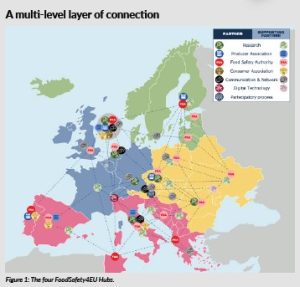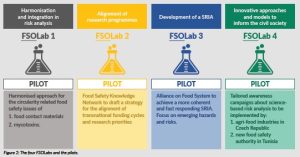Food safety is imperative for health, social and economic reasons. The EU food safety legal framework is currently based on evidence and risk analysis. However, it is not quick enough to adapt and undertake issues arising from the food sector dynamics. Also, consumers are likely to be aware of food safety only in times of crisis, when the risk of misinformation and the loss of consumer/citizen trust is high. In addition, researchers, policymakers and food business operators have no integrated mechanisms to nurture a continuous and trusted interaction. FoodSafety4EU aims to tackle all these challenges, co-designing new schemes to advance the food safety systems (FSSs) from a reactive system to an interactive one; to promote food safety information among the public rather than communicate the risks as a reaction to a food crisis.
What is the FoodSafety4EU platform?
This platform is intended to drive the transition of the existing European FSS towards a comprehensive and constantly updated framework, enabling the FSS actors to efficiently access resources and data, share and exchange scientific knowledge and contributions, interact and network, and create new partnerships and joint activities. On top of the digital dimension, the platform enables a ‘physical’ interaction, guaranteeing the participatory process of all actors through four layers.
Layer 1
FoodSafety4EU Hubs
As the first level of interaction, four FoodSafety4EU Hubs (Figure 1) work as decentralised nodes to catalyse the main experts of the respective geographical areas and create the basis to feed a multi-actor discussion. These four areas face similar issues in the local FSSs. They have different food production chains, market dynamics and innovation/technological levels. In each of them, representatives of policymakers, researchers, food business operators and consumers are actively involved in the participatory process. This ecosystem was already set up before the beginning of the project; through mapping and the involvement of FoodSafety4EU supporting partners, stakeholders committed to contributing to the definition of the FSS of the future. Currently, the project consists of 50 supporting partners (in addition to the 23 beneficiaries), but the numbers are increasing, and the project is open to new collaborations.
Layer 2
Food safety operational labs
As a second layer of the participatory process, FSS actors interact through four food safety operational labs (FSOLabs), ‘rooms’ for social experimentation addressing complex food safety-related topics on a systemic level. They involve experts representing different FSS actors in a cycle of interactive meetings, in which they can discuss and find new ways to tackle the selected four challenges, which are:
- harmonisation and integration of the FSS, to be supported through pilot actions and recommendations
- alignment of research priorities and funding cycles within and among the EU member states
- development of a Strategic Research and Innovation Agenda (SRIA) on food safety
- definition of innovative approaches and models to inform the civil society.
After the mapping and analysis exercise to set up each FSOLab, experts co-created possible solutions to address the identified channels, developing pilot activities to be tested in real scenarios. The process will run until the end of 2022, when each FSOLab will assess and analyse the results obtained, translating them into new outputs to be adopted by stakeholders. Experts were involved by project beneficiaries, supporting partners and other stakeholders in the FSS, including EFSA—the European Food Safety Authority, participating in all FSOLabs.
FSOLab 1 focuses on the need for harmonisation and integration, specifically linked to risk analysis in a circular economy. The increasing call for sustainability comes from the desire to reduce our environmental impact. However, it raises new potential issues from a food safety point of view. For example, recycled materials can contain contaminants from previous (mis-)use. These issues cannot be predicted with conventional risk assessments, nor do food safety authorities have the data necessary to perform the risk assessment. This FSOLab attempts to increase the ability of the FSS to deal with the transition safely, particularly within two pilot actions: food contact materials and mycotoxins.
FSOLab 2 aims to propose strategies to better align research programmes and funding opportunities at the national and EU level. Given the large inequalities in the distribution of economic resources and research funds among individual countries, there can be major implications for a country’s performance in terms of food safety progress. FSOLab 2 will pilot a Food Safety Knowledge Network to draft a strategy for aligning transnational funding cycles and research priorities as a fundamental part of safe and sustainable food systems.
FSOLab 3 is committed to developing a proposal for a SRIA. Its mission is to build a common strategy to prioritise and address emerging risks and hazards. Specifically, FSOLab 3 is developing a process for achieving a more coherent SRIA by piloting an Alliance on Food Systems, thus contributing to reinforcing the role of Europe as a global leader in food safety standards and creating broader impacts on society.
FSOLab 4 is focused on innovative and novel communication methods informing civil society about food safety research and the risk assessment process. Two tailored communication campaigns to increase awareness about the science-based risk analysis processes are being designed to be implemented by national, innovative agri-food industries in the Czech Republic and by a newborn food safety authority in Tunisia. Cartoon format and online/print dissemination channels will reach young adults.
Layer 3
Digital tools
Besides the four FoodSafety4EU Hubs and the four FSOLabs, the third layer of interaction relies on implementing a digital platform with apps that will enable the interaction among different actors within the FSS and facilitate access to a variety of resources related to food safety issues. The goal is to have a central platform as a single-entry point for FSS actors. The platform will allow users to get information about running FSO labs, including results and options to give feedback. The platform should also allow experts and projects for certain topics to be found. In addition, the platform will provide catalogues for datasets, apps, services, and other materials allowing users to search resources for their interest in food safety. File storage is another functionality that can be used by FSOLabs and by users of the platform to exchange documents or collaborate on certain documents. The platform will also contain news and agendas for the coming activities (i.e. events, webinars) and will be used as one of the communications channels for the community.
Layer 4
EU Food Safety Forum
At last, the fourth level of interaction among the FSS actors will be based on the participatory and networking process, proposing the FoodSafety4EU platform as an interface for long-term science-policy-society cooperation within the European food safety ecosystem: the EU Food Safety Forum. As a main output of the project, the forum will be built by the interaction of all actors during the project’s timespan and through the three previous layers. However, thanks to the vibrant ecosystem already established during the first year, the first step of the path towards a long-term and self-sustainable forum was done in December 2021, when the first edition of the pre-forum took place, attended by more than 120 participants—representing supporting partners and other stakeholders. After inspirational pitches, the conference turned into a participatory session of learning and discussion, the audience asking questions to the experts, expressing opinions and sharing ideas via real-time polls. The event insights will guide FoodSafety4EU in defining next year’s second pre-forum.
The focus on consumers
In a survey conducted by FoodSafety4EU on consumers (results will be published during the next months), it emerged that consumers have a low level of concern for food safety and that are barely reached by information on this topic. To address this issue, FoodSafety4EU is designing and implementing a series of awareness-raising campaigns, some of which were already conducted. For instance, the project explained the main terms of the food safety glossary, provided tips on how to avoid hazards with foods used for the winter holiday and realised a social media campaign in June 2021 together with the World Food Safety Day, and much more. Another initiative—#AskTheExpert—aims to strengthen the consumers’ trust in scientists: indeed, the public can ask questions on food safety topics (e.g. on allergens, food additives, novel food, etc.) through social media and receive replies from experts in easy-to-understand language.
Project summary
FoodSafety4EU contributes to enhancing common efforts and building synergies within the EU Food Safety System through the co-design of an integrated and multi-stakeholder platform. This enables a network of FSS actors at the national, European and international levels to access resources efficiently, synchronise food safety research strategies, and share and exchange scientific knowledge.
Project lead
The FoodSafety4EU project coordinator, Dr Veronica Lattanzio, is a chemist and senior researcher at the National Research Council of Italy – Institute of Sciences of Food Production (CNR-ISPA). ISPA-CNR carries out research activities in many areas of food production including food and feed safety and it has considerable experience in coordinating/participating in various local, national, and international research and innovation projects.
Project partners
The FoodSafety4EU consortium consists of a multidisciplinary team of 23 partners from 12 EU member states and associated countries and about 50 stakeholders (food safety authorities, consumers’ associations, research centres, industries, etc.). This community is expected to continue to grow and evolve into a forum by the end of the project.
Contact details
Dr Veronica Lattanzio
National Research Council of Italy – Institute of Sciences of Food Production (CNR-ISPA – Italy)
Web: foodsafety4.eu/
Twitter: @fs4eu
Facebook: www.facebook.com/FS4EU/
Instagram: instagram.com/fs4eu/
LinkedIn: www.linkedin.com/company/foodsafety4eu/
Figures
Figure 1: The four FoodSafety4EU Hubs.
Figure 2: The four FSOLabs and the pilots.



